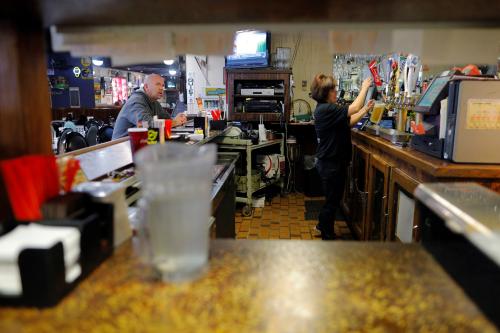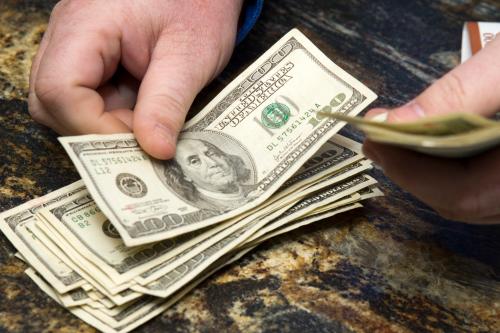This op-ed was originally published in Barron’s on March 25, 2020.
As the U.S. economy physically shuts down, access to digital payments is becoming a necessity. The Internet economy does not take cash. This Covid-19 recession is bringing to the surface a long-standing divide over the cost and accessibility of digital payments. Bridging this divide is key to the response to this pandemic-induced recession.
House Speaker Nancy Pelosi recognizes this problem. Her decision to include a requirement to create public digital wallets for consumers in one House version of the Covid-19 response bill makes clear the time to tackle the problem is now. While the language did not survive into the final bill, the point is clear: Everyone needs low-cost access to digital payments.
The poorest lack access to basic banking because payment mechanisms are highly segregated by income, by design. The richer you are, the more rewarding your credit card. Not enough money, no card for you. According to the Federal Deposit Insurance Corp, around one out of every 14 households are unbanked. Their access to the online economy is through prepaid cards, which are expensive to use due to hefty upfront purchase fees and additional fees for services the rest of society takes for granted—such as the ability to check your balance or maintain an account month to month. These services are provided, just at a cost; imagine paying $1 to check your balance.
Access is not the only problem. Digital payments can be extremely expensive even for those with bank accounts. Every year 30% of Americans hit the zero lower balance of their bank account, triggering an overdraft payment. Each overdraft costs roughly $35. Estimates indicate one billion overdrafts a year, meaning that debit card users pay an estimated $35 billion a year in overdraft fees.
The bulk of the fees are paid by the same people, over and over again. The Consumer Financial Protection Bureau estimates that 8% of Americans account for about three-quarters of these overdraft fees. These consumers, who outnumber the unbanked, overdraft more than 10 times a year, paying on average $380 a year in overdraft fees. That is nearly the same share of income that someone in the 40th percentile pays in federal, state, and local income taxes a year. Who would have thought that the digital-payments fee for some middle-class Americans could rival their taxes?
For these consumers, the decision to use their debit cards for digital payments means a given online price may not be the true cost to them. They need to assess how much money they have available, when their deposits are going to clear, and how many other outstanding payments are about to hit their account. Miscalculate, and that $40 Amazon purchase now costs $75. Quite a difference.
There’s another hidden cost for the un- and underbanked. Prepaid cards require prepositioning funds, a burden for those living with unpredictable income and expenses. Try to gain purchasing power or lower fees by buying a card for a specific service (Uber or iTunes) and your funds are further restricted. Money uploaded onto a gift card can’t cover an unexpected need.
No wonder that prepaid cards are prevalent: One out of every ten swipes at a register was on a prepaid card. Put another way, two-thirds of Americans use their debit card monthly, while 20% use a prepaid card monthly. They do so not because they are unbanked, but because it is very expensive to use a debit card if you are not certain you have money in your account at that moment.
What should we do? There are three simple ways to address these problems in the response to Covid-19.
First, policymakers need to get funds to people in forms that are cheap to use electronically. This is what the House proposal tried to solve. But rather than create something new, a simpler and faster approach is to direct Treasury stimulus payments through existing debit cards for programs like SNAP (aka food stamps), which are working.
This money also needs to arrive quickly. The Federal Reserve can use existing legal authority to reduce the time banks hold Treasury checks or electronic payments of any means, so that existing bank customers get immediate access to the first $5,000 of any deposit, instead of waiting one to six days for the money to be available. If the Fed won’t use its authority, Congress should change the law as Sens. Chris Van Hollen and Elizabeth Warren along with Reps. Ayana Pressley and Jesús García have proposed. A sad outcome of the Covid-19 stimulus bill is that check-cashers are going to make a fortune providing people access to their stimulus checks immediately, taking money out of the pockets of people who need it the most.
Second, banks should temporarily suspend all overdraft fees when consumers have enough money in their accounts within five days. Sens. Sherrod Brown and Cory Booker have introduced legislation to suspend overdrafts during the epidemic. Now is not the time to penalize consumers for temporary cash shortages. Since regulators are providing banks all types of waivers and short-term relief, the banks should do the same for their lowest-income customers. If Congress doesn’t act, bank regulators can require this as a condition of receiving certain regulatory relief during the crisis.
Finally, America needs to appreciate that access to digital payments is a cornerstone problem costing millions of people billions of dollars and preventing families from sharing in the benefits of the digital age. A two-tiered economy, where one group is forced to rely on potentially virus-contaminated cash or expensive prepaid cards, while the other gets 2% off of every grocery item, is just wrong.
Whether or not digital dollars and required public bank accounts at the Federal Reserve are the right answer, something must change and change quickly. The current system, relying on those with the least paying billions in fees, while those with the most get tax-free rebate checks, is not only an outrage, but in this case a danger to everyone’s health.







Commentary
Op-edA big problem for the coronavirus economy: The internet doesn’t take cash
March 25, 2020